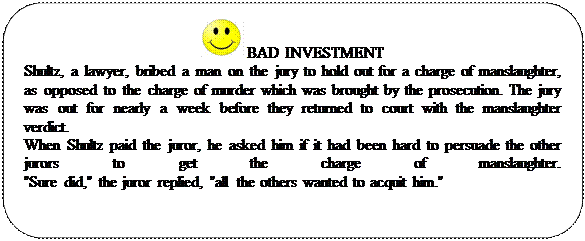 |
Главная Случайная страница Контакты | Мы поможем в написании вашей работы! | |
Common questions of jurors
|
|
How are people chosen to be called for jury service?
The New York State court system maintains and updates each year the names of state residents who are included on certain lists - state and local taxpayers, licensed drivers, registered vehicle owners, applicants for or recipients of public assistance benefits and recipients of state unemployment compensation. Prospective jurors are selected randomly form those lists, as well as lists of persons who volunteer for service, by the Commissioner of Jurors or each county and the County Clerks in New York City.
Questionnaires are sent to people in the selected pool of names, which must be completed and returned. Those individuals who "qualify" for service - U.S. citizen and county resident; at least 18 years of age; mentally and physically capable of performing jury duty; with no felony convictions; and able to understand and communicate in English - may eventually be summoned to report for service.
How long does a juror serve?
The juror summons generally indicates the length and exact dates of the term that a juror is expected to serve. Those who are selected are only required to serve on one trial. On average, the length of a trial ranges from three to five days.
Is it true that sometimes jurors are not allowed to go home until after the trial is over? Is this common?
As a general rule, jurors go home at the end of the day and return the next morning. There are occasions, however, that require a court to "sequester" a jury on a criminal case overnight during deliberation on a verdict. In extremely rare cases, a jury may be sequestered during the trial itself. "Sequestered" means that jurors do not go home at the end of the day, but stay in a hotel, where their access to other people and to radio and television news or newspapers is limited.
The expense of all meals and lodging for sequestered jurors is the responsibility of the Commissioner of Jurors of each county or the respective County Clerks in the City of New York.
Are jurors compensated?
For each day that a juror performs service, he or she may be entitled to a per diem $15 allowance. The amount of the payment is established by the New York Sate Legislature.
In rare instances, when service extends for more than 30 days, the court may authorize an additional allowance of $6 per day to be paid to a juror.
A juror may waive his or her right to the per diem allowance.
What about the juror's job?
New York State law prohibits an employer from subjecting an employee to penalties or termination of employment due to jury service - so long as the employee notifies the employer upon receipt of the jury summons. An employer may lawfully withhold wages during jury service and the question of salary and wages is a matter to be addressed between the juror and the employer.
Is possible to report for jury service but not sit on a jury?
Yes. In many cases, parties seek to settle their differences and to avoid the expense and time demanded by a trial.. Thus, while several trials may be scheduled for one particular day, the court cannot be certain until that morning, and sometimes afternoon, which cases will actually require a jury.
Who else will be in the courtroom?
A number of people will be in the courtroom in addition to the judge and jury. The list below explains who they are and what they may be doing.
Plaintiff - In a civil case, the plaintiff is the party who initiates the lawsuit by bringing the case to court.
Defendant - In a civil matter, the defendant is the party who is being sued. In a criminal case, the defendant has been charged with a crime.
Attorneys - In certain cases, including criminal cases, attorneys representing the plaintiff, the defendant or the government are referred to as counsel. An attorney representing the government in a criminal case is called the prosecuting attorney or the assistant district attorney, and in some cases, the assistant attorney general.
Court Reporter - The court reporter records the official record of the trial by recording every word which is spoken. This record will be converted into an official transcript of the trial.
Court Clerk - The clerk of the trial part, also called the clerk, maintains the court files and preserves the evidence presented during the trial. The clerk may also administer the oath to jurors and witnesses.
Witnesses - Witnesses provide testimony, under oath, as to what they have seen, heard or otherwise observed regarding the case.
Interpreter - Interpreters, under oath, provide language interpretation for the court on behalf of a non-English speaking party or witness.
Spectators - Spectators are members of the public who are generally permitted to observe the court proceedings. Often spectators include representatives or the media.
NOTES:
per diem (лат.) - каждый день, ежедневно
 Answer the following questions:
Answer the following questions:
1) Why the jury is an arm of the court?
2) What is the jury’s job?
3) How prospective jurors are selected?
4) Who can be a juror?
5) What is the average length of a trial?
6) What is sequester and in what situations it is possible?
7) Does the juror receive his salary during jury service?
8) When is possible to report for jury service but not sit on a jury?
9) Who else can be in the courtroom and what are their functions?
 |
TASK 6. (a)Study the text below, making sure you fully comprehend it. Where appropriate, consult English-Russian dictionaries and/or other reference & source books on law.
Дата публикования: 2014-10-25; Прочитано: 1266 | Нарушение авторского права страницы | Мы поможем в написании вашей работы!
